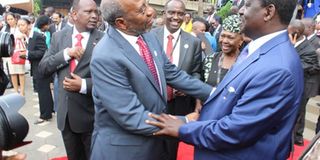Guarantee LDCs more trade freedom, Uganda tells WTO

Rugunda shares a light moment with Kenya’s opposition leader Raila Odinga in Nairobi on Tuesday. COURTESY PHOTO
What you need to know:
Uganda wants the World Trade Organisation (WTO) meeting in Nairobi to conclude negotiations on key trade issues that have dragged on the agenda for nearly 15 years now
Kampala. Uganda wants the World Trade Organisation (WTO) meeting in Nairobi to conclude negotiations on key trade issues that have dragged on the agenda for nearly 15 years now.
Among the issues delivered by Prime Minister Ruhakana Rugunda, Uganda wants the Doha negotiations, also referred to as the development agenda, which was launched in November 2001 in Doha, Qatar, at the WTO’s 4th ministerial conference to be concluded.
The Doha Round focuses on issues affecting the Least Developed Countries (LDCs) such as agricultural reforms, particularly reductions in subsidies, market access, special treatment of poor countries and matters of trade facilitation.
According to the Prime Minister, the dragging on of the Doha negotiations has denied LDCs that include Uganda, a chance to benefit from the opportunities abound in global trade—the multi-lateral trading system.
Dr Rugunda was speaking at the 10th WTO ministerial conference on Tuesday in Nairobi, Kenya. He was representing President Museveni.
He said: “The negotiators in the WTO should work towards the conclusion of the Doha Development Agenda in Nairobi so that LDCs like Uganda can have unlimited access to the international markets.”
He added: “Africa being the majority of the LDCs in the WTO; they will remain active in the negotiations because without trade, it will be very hard to lift the so many millions of Africans out of poverty.” In his opening remarks, Kenyan president Uhuru Kenyatta said Africans derive their livelihood from agriculture and therefore cannot sacrifice it for anything.
He said: “There is no way African farmers can compete with heavily subsidised agricultural products from the developed countries. This only causes distortions in the agricultural sector here (in Africa).”
Agricultural subsidies have remained a contentious issue in WTO talks since the Doha Round One, with LDCs claiming that developed countries offering domestic support to their farmers as subsidies damages Africa’s agriculture and industry.
LDCs have for long advocated for the lifting of the agricultural subsidies by the West to create a level trading field, but up to date, no outcome of commercial value on the matter has been achieved.
Demands from LDCs
High on Uganda’s agenda is the achievement of international trade rules that facilitate Ugandan goods and services to access international markets at preferential terms.
In the agriculture negotiations, Uganda wants substantial improvements in market access of her agricultural products and reductions of all forms of export subsidies by developed countries. Majority of the LDCs including Uganda are pushing for the elimination of export subsidies particularly on cotton and coffee.




